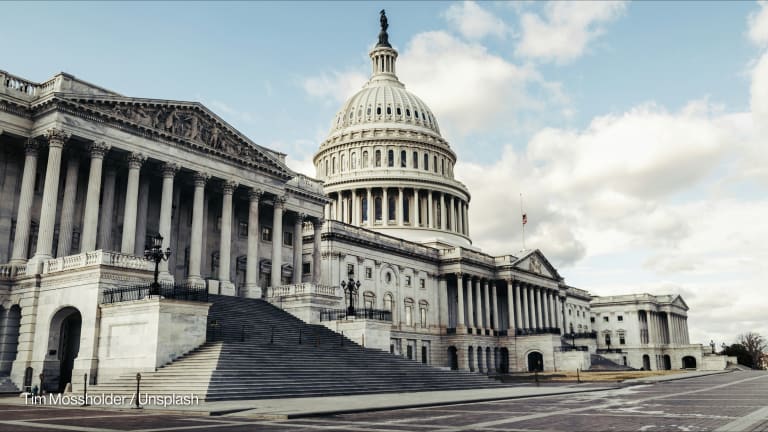Aid advocates want future US COVID-19 funding to have global focus

WASHINGTON — Now that the U.S. Congress has approved a largely domestic-focused $2 trillion supplemental appropriations package, development professionals are looking ahead to what future funding might mean for the global response to COVID-19.
“We do need to think soon and hard about what are going to be the potential impacts on food security, on health infrastructure, on education.”
— Bill O’Keefe, executive vice president for mission, mobilization, and advocacy, Catholic Relief Services“Obviously, the first priority was to deal with the urgent health and economic crisis facing the American people. But now Congress needs to turn to the global health security agenda and make a serious commitment, because there is no way to defeat coronavirus here if we don’t address it around the world,” Liz Schrayer, president and CEO of the U.S. Global Leadership Coalition, told Devex.
What the massive US funding deal means for international COVID-19 response
As the coronavirus outbreak spreads to low- and middle-income countries, will global health efforts see additional U.S. support?
Both in the response to COVID-19 and with typical appropriations, Congress has demonstrated a bipartisan commitment to foreign aid. While there have been a few efforts counter to that — including Republican Sen. Rand Paul’s attempt to tap the foreign aid budget to fund part of the first COVID-19 supplemental funding bill — they have been rejected.
Lawmakers realize that further bills will need to address the global response, and some are already thinking about what will happen in future legislation to address COVID-19, development advocates told Devex.
“I think these conversations are already starting,” Schrayer said.
While it seems likely there will be additional supplemental funding bills, several development and global health advocates told Devex they are concerned about whether they will take a more global focus.
“Do we have an opportunity again in the global health and development community to remind policymakers of the root causes of this and encourage them to adopt a similar theme for the next tranche?” asked Loyce Pace, president and executive director of the Global Health Council.
For all the latest news, jobs, funding opportunities — including remote work and social distancing resources.
There’s also another worry: whether lawmakers, having already committed so much, will have an appetite to push through future spending bills including more global funding.
“I think my worry is we spent it all. We didn’t really have $2 trillion to spend, one might argue, so how large can we expect these forthcoming packages to be — if they even come to fruition — and how soon will some level of fatigue set in?” Pace said.
Scott Morris, director of the US Development Policy Initiative at the Center for Global Development, told Devex that it was unrealistic to expect a full international funding package from Congress at this time but said he hopes that “minds remain open not only on [Capitol Hill] but in the administration.”
It remains unclear how much funding will be necessary given rapidly evolving situations, but aid implementers are already seeing a direct impact on their operations, development experts told Devex.
As the international community comes to grips with the scale of global need, donor coordination will be critical, said Bill O’Keefe, executive vice president for mission, mobilization, and advocacy at Catholic Relief Services.
“We don’t have to do it all, but I would hope that our government and other governments are already talking about how to coordinate better our response and any longer-term efforts when that time comes — which isn’t yet, obviously,” O’Keefe said.
“I think my worry is we spent it all.”
— Loyce Pace, president and executive director, Global Health CouncilAdditional funding for global health security will be important in the future, as will investments in resilience and long-term funding to respond to the economic ramifications of the pandemic, experts said.
“We do need to think soon and hard about what are going to be the potential impacts on food security, on health infrastructure, on education,” O’Keefe said. “We have to think about the preparedness, the response, and the recovery phase.”
There are a few specific requests that the global health community will likely have for lawmakers going forward. One is that Congress should authorize a contribution to the Coalition for Epidemic Preparedness Innovations as “an important global complement to bilateral research and development in the U.S.,” said Brandon Ball, senior lead of congressional relations at PATH.
Future legislation should also consider the effects of the response on broader programming and provide the U.S. Agency for International Development and the Centers for Disease Control and Prevention with expedited hiring authority and the ability to bring in additional employees to cover for staff who are deployed in the response, he said.
Congress should also look for ways to make sure that funding is moving quickly and being used to respond to immediate needs — perhaps by including language that requires funding to be made available within a short period of time, which has been done with some of the domestic COVID-19 funding, Ball said.
Devex Senior Reporter Michael Igoe contributed reporting to this article.

Search for articles
Most Read
- 1
- 2
- 3
- 4
- 5








